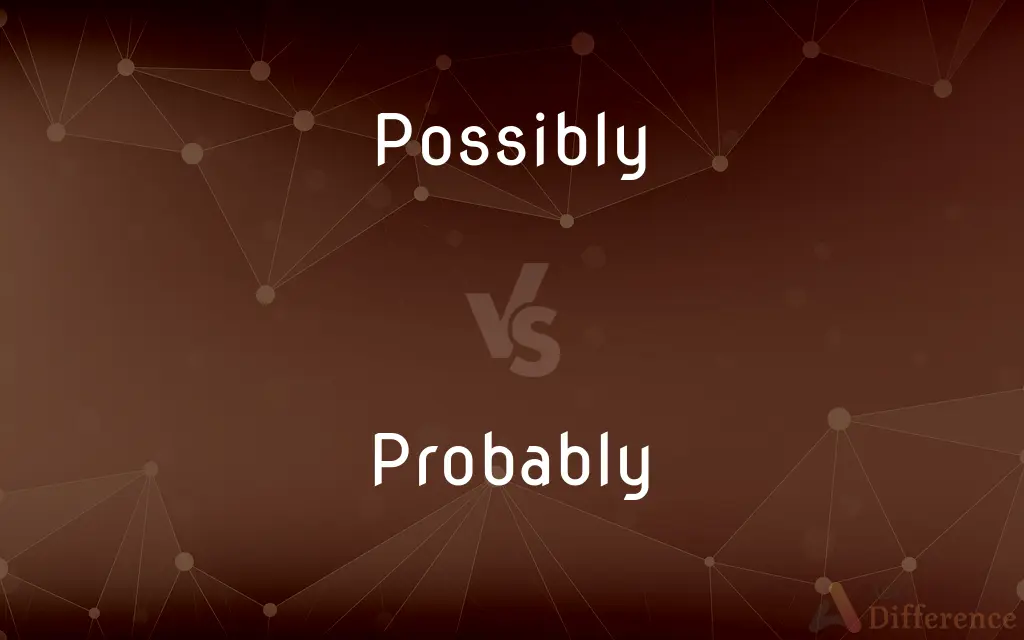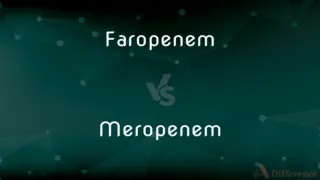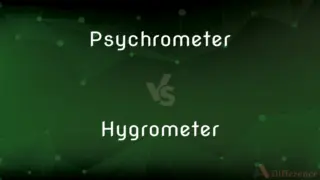Possibly vs. Probably — What's the Difference?
By Maham Liaqat & Fiza Rafique — Updated on April 3, 2024
Possibly suggests a situation can happen, though it's uncertain, while probably indicates a higher likelihood of occurrence.

Difference Between Possibly and Probably
Table of Contents
ADVERTISEMENT
Key Differences
Possibly refers to a chance that something might happen or be true, emphasizing uncertainty and a range of outcomes. Whereas probably denotes that something is more likely to happen than not, suggesting a greater degree of confidence in the outcome.
Possibly is often used when the odds are not clearly in favor, highlighting the element of doubt. On the other hand, probably is used when there's enough evidence or reason to believe that something will likely occur, though it's not guaranteed.
In conversation, saying something could possibly happen leaves more room for doubt and less commitment to the prediction. Whereas saying something will probably happen signals a stronger belief in the future occurrence of that event, influencing the listener's expectations.
Possibly can be applied in situations where the likelihood is unknown or where one wants to express a conservative estimate. In contrast, probably is more definitive, often used when there's a quantifiable chance greater than 50%.
The use of possibly often implies a need for further information or consideration before making a decision. Conversely, probably suggests that, while not certain, the speaker has a strong inclination towards a particular outcome based on the available information.
ADVERTISEMENT
Comparison Chart
Likelihood
Uncertain, any level of chance
More likely than not
Connotation
Indicates doubt and uncertainty
Suggests confidence in outcome
Usage Context
When outcome is unclear
When outcome seems likely
Decision Making
Implies need for more information
Suggests readiness to act
Quantification
Cannot be quantified easily
Often implied over 50% chance
Compare with Definitions
Possibly
Might occur or be true.
It could possibly rain later, so bring an umbrella.
Probably
Likely to happen or be the case.
It will probably rain later according to the forecast.
Possibly
Can be done. feasible.
With some adjustments, it's possibly the best solution.
Probably
Used to indicate a high degree of certainty.
She’s probably the best candidate for the job.
Possibly
Used to express uncertainty.
I possibly won’t make it to the meeting on time.
Probably
As a qualifier for statements of likelihood.
You'll probably find it in the kitchen.
Possibly
As a polite addition to requests or suggestions.
Could you possibly lend me a hand?
Probably
To suggest a probable outcome.
He’s probably too busy to answer the phone now.
Possibly
To introduce a speculative idea.
Could there possibly be life on other planets?
Probably
Reflecting an assumption.
They’re not home, so they probably left early.
Possibly
Perhaps
He hesitated, possibly remembering his unsuccessful last attempt.
Probably
Most likely; presumably.
Possibly
Conceivably
Could they possibly be here already?.
Probably
In all likelihood.
Possibly
Under any circumstances
I can't possibly do it.
Probably
In a probable manner; in likelihood.
Distinguish between what may possibly and what will probably be done.
Possibly
(modifying a clause or predicate) Perhaps; indicates that the proposition may be true (is not certainly false) regardless of any facts or circumstances known to, stated by or implied by the speaker.
Possibly, they will make gains in the midterm elections.
It was possibly the costliest mistake in the organization's history.
This rare and possibly unique specimen must be conserved.
Probably
With considerable certainty; without much doubt;
He is probably out of the country
In all likelihood we are headed for war
Possibly
(modifying a verb) In the realm of possibility; indicates that the action may successfully be performed (is not impossible) regardless of any facts or circumstances known to, stated by or implied by the speaker that might limit the performance.
I'm much stronger than you, so you can't possibly win.
I couldn't possibly be there on time.
I couldn't possibly cheat on my wife.
It seems unlikely, but, yes, they could possibly win even now.
The police don't know him, and the information they have leads them to think he could possibly have murdered his wife.
Probably
Easy to believe on the basis of available evidence;
He talked plausibly before the committee
He will probably win the election
Possibly
In a possible manner; by possible means; especially, by extreme, remote, or improbable intervention, change, or exercise of power; by a chance; perhaps; as, possibly he may recover.
Can we . . . possibly his love desert?
When possibly I can, I will return.
Possibly
By chance;
Perhaps she will call tomorrow
We may possibly run into them at the concert
It may peradventure be thought that there never was such a time
Possibly
With a possibility of becoming actual;
Introducing possibly dangerous innovations
He is potentially dangerous
Potentially useful
Possibly
In a manner or to a degree possible of conceiving;
Is it possibly true?
Possibly
To a degree possible of achievement or by possible means;
They can't possibly get here in time for the funeral?
Common Curiosities
What does possibly mean?
Possibly means there is a chance that something might happen or be true, but it's not certain.
Is possibly less certain than probably?
Yes, possibly indicates a lower level of certainty compared to probably.
Can possibly and probably be used interchangeably?
While they both discuss likelihood, they are not interchangeable due to their differing degrees of certainty.
Does probably imply over 50% chance?
Yes, probably implies that there's a greater than 50% chance of something happening.
Can possibly imply a high chance of occurrence?
Possibly generally suggests uncertainty, so it doesn’t directly imply a high chance, though it doesn’t exclude it either.
Why use possibly instead of probably?
Use possibly when you want to express uncertainty or consider a wider range of outcomes.
How do you use possibly in a sentence?
"We could possibly go to the beach this weekend, weather permitting."
How do you use probably in a sentence?
"We will probably go to the beach this weekend, as long as it doesn't rain."
What does probably mean?
Probably means something is likely to happen or be true, indicating a high degree of certainty.
How does possibly affect decision making?
Using possibly suggests a need for further information or consideration before making a decision.
Why use probably instead of possibly?
Use probably when you want to express a greater degree of confidence about a future event or outcome.
How does probably affect decision making?
Using probably suggests that, while not certain, there’s enough confidence to lean towards a particular decision.
Does using probably make a statement more convincing?
Probably can make a statement more convincing by indicating a higher likelihood of it being true.
In what context would possibly be more appropriate than probably?
Possibly is more appropriate in contexts where outcomes are uncertain and you wish to remain non-committal.
In what context would probably be more appropriate than possibly?
Probably is more appropriate when you wish to convey confidence in the likelihood of an event or outcome.
Share Your Discovery

Previous Comparison
Faropenem vs. Meropenem
Next Comparison
Psychrometer vs. HygrometerAuthor Spotlight
Written by
Maham LiaqatCo-written by
Fiza RafiqueFiza Rafique is a skilled content writer at AskDifference.com, where she meticulously refines and enhances written pieces. Drawing from her vast editorial expertise, Fiza ensures clarity, accuracy, and precision in every article. Passionate about language, she continually seeks to elevate the quality of content for readers worldwide.














































